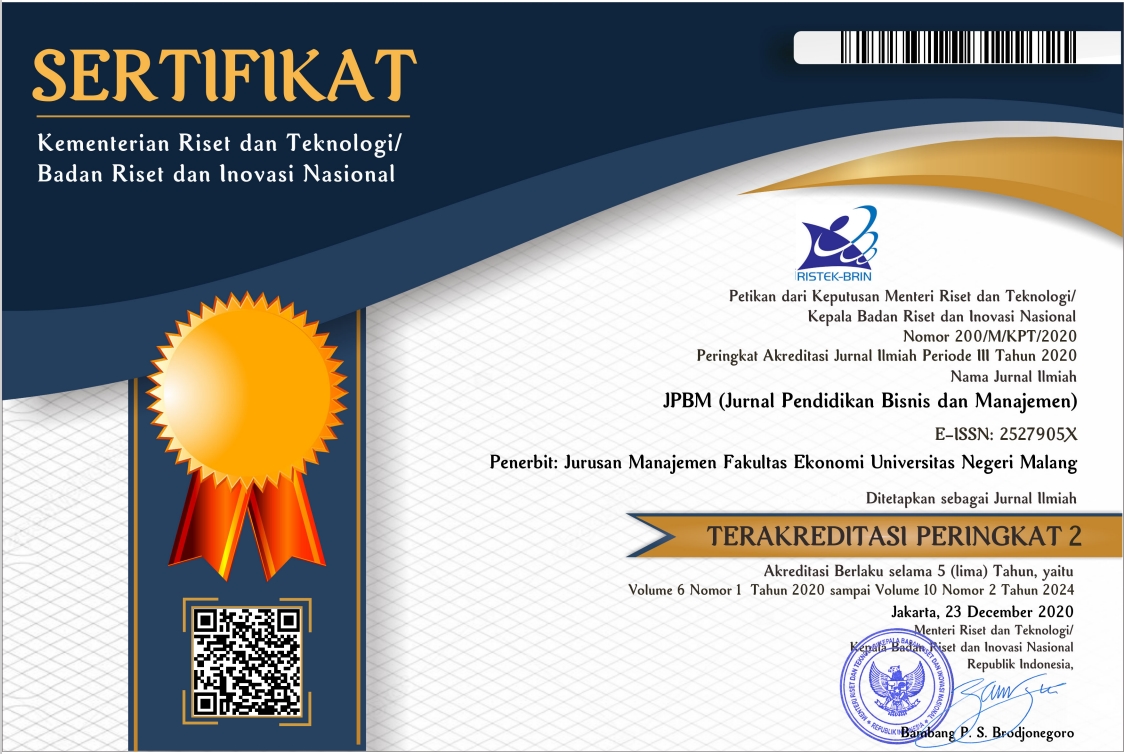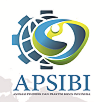The Influence of Family Welfare on Work Motivation and Its Impact on the Performance of Private High School Teachers in Jambi
Abstract
Teacher performance greatly determines school performance in providing educational services to stakeholders. Improving teacher performance must be seen as a shared interest between educational institutions and the government. This research examines the influence of family welfare on work motivation and its impact on teacher performance. The research was conducted using a survey method among teachers at private high schools in Jambi of Indonesia. Respondents were selected randomly after sampling the entire population using area sampling techniques, namely 120 out of 239 teachers. Data were analyzed using the PLS-SEM model. The results of the analysis show that the family welfare of private high school teachers in Jambi has an indirect influence through work motivation on teacher performance. Work motivation has a prominent role in improving teacher performance. The higher the level of family welfare, the greater the teacher's work motivation and the higher the teacher's work motivation, the greater the performance. The results of this research also provide practical implications for educational management institutions or foundations in improving teacher performance through increasing family welfare and work motivation.
Keywords: Family welfare, Work motivation, Teacher performance
Full Text:
PDFReferences
Abramovitz, M. (2017). Regulating the lives of women. Taylor & Francis. https://doi.org/https://doi.org/10.4324/9781315228150
Acharya, A. S., Prakash, A., Saxena, P., & Nigam, A. (2013). Sampling: Why and how of it? Indian Journal of Medical Specialities, 4(2), 330–333. https://doi.org/10.7713/ijms.2013.0032
Albrecht, N. J. (2023). Editorial: Teaching wellbeing in higher education. Frontiers in Education, 8(November). https://doi.org/10.3389/feduc.2023.1304700
Andriani, S., Kesumawati, N., & Kristiawan, M. (2018). The influence of the transformational leadership and work motivation on teachers performance. International Journal of Scientific and Technology Research, 7(7), 19–29.
Anwar, K., Widyanti, R., Adawiah, R., & Triyuliadi, U. (2021). The Effect of work motivation and commitment on teacher performance. International Journal of Science and Society, 3(4), 106–118. https://doi.org/10.54783/ijsoc.v3i4.397
Arifin, M. F. N., & Choiriyah, S. (2021). Human resources welfare management program in improving teacher performance at Smpit Al-Anis Kartasura. International Journal of Multicultural and …, 8(10), 526–533.
Awoke, H. M., & Wollo, S. (2015). Service quality and customer satisfaction : empirical Evidence from saving account customers of banking industry. 7(1), 144–165.
Bahr, N., & Mellor, S. (2016). Building quality in teaching and teacher education. In Quality in Teaching and Teacher Education. ACER Press. https://doi.org/10.1163/9789004536609_017
Baker, B. D. (2016). Does money matter in education? Second edition. Albert Shanker Institute.
Biesta, G., Priestley, M., & Robinson, S. (2015). The role of beliefs in teacher agency. Teachers and Teaching: Theory and Practice, 21(6), 624–640. https://doi.org/10.1080/13540602.2015.1044325
BKKBN. (2022). Indikator kesejahteraan keluarga [Indikator kesejahteraan keluarga] (in Indonesian). http://aplikasi.bkkbn.go.id/mdk/BatasanMDK.aspx
Boeskens, L. (2016). Regulating publicly funded private schools: A literature review on equity and effectiveness. OECD Education Working Papers, 147.
Canrinus, E. T., Helms-Lorenz, M., Beijaard, D., Buitink, J., & Hofman, A. (2012). Self-efficacy, job satisfaction, motivation and commitment: Exploring the relationships between indicators of teachers’ professional identity. European Journal of Psychology of Education, 27(1), 115–132. https://doi.org/10.1007/s10212-011-0069-2
Chin, W. W. (1998). Commentary issues and opinion on structural equation modeling. MIS Quarterly, 22(1), 7–16. http://www.jstor.org/stable/249674
Cochran-Smith, M., Piazza, P., & Power, C. (2013). The politics of accountability: Assessing teacher education in the United States. Educational Forum, 77(1), 6–27. https://doi.org/10.1080/00131725.2013.739015
Darling-Hammond, L. (2017). Teacher education around the world: What can we learn from international practice? European Journal of Teacher Education, 40(3), 291–309. https://doi.org/10.1080/02619768.2017.1315399
Darling-Hammond, L., Holtzman, D. J., Gatlin, S. J., & Heilig, J. V. (2005). Does teacher preparation matter? Evidence about teacher certification, teach for america, and teacher effectiveness. Education Policy Analysis Archives, 13(42), 1–48.
Demirkasimoǧlu, N. (2010). Defining “teacher professionalism” from different perspectives. Procedia - Social and Behavioral Sciences, 9, 2047–2051. https://doi.org/10.1016/j.sbspro.2010.12.444
Elnaga, A., & Imran, A. (2013). The effect of training on employee performance. International Journal of Recent Technology and Engineering, 5(4), 137–147. https://core.ac.uk/download/pdf/234624593.pdf
Fadeyi, T. V., Sofoluwe, O. A., & Gbadeyan, A. R. (2015). Influence of teachers’ welfare scheme on job performance in selected Kwara State secondary schools. Asia Pacific Journal of Education, Arts and Sciences, 2(4), 89–93.
Fernet, C., Trépanier, S. G., Austin, S., & Levesque-Côté, J. (2016). Committed, inspiring, and healthy teachers: How do school environment and motivational factors facilitate optimal functioning at career start? Teaching and Teacher Education, 59, 481–491. https://doi.org/10.1016/j.tate.2016.07.019
Ghazali, I. (2014). Struktural equation modelling metode alternative dengan partial least squares (PLS). Badan Penerbit Universitas Diponegoro,.
Gu, Q., & Day, C. (2013). Challenges to teacher resilience: Conditions count. British Educational Research Journal, 39(1), 22–44. https://doi.org/10.1080/01411926.2011.623152
Hakim, A. (2015). Contribution of competence teacher (pedagogical, personality, professional competence and social) on the performance of learning. The International Journal Of Engineering And Science, 4(2), 1–12. www.theijes.com
Han, J., & Yin, H. (2016). Teacher motivation: Definition, research development and implications for teachers. Cogent Education, 3(1), 1–18. https://doi.org/10.1080/2331186X.2016.1217819
Hanushek, E. A. (2013). Economic growth in developing countries: The role of human capital. Economics of Education Review, 37, 204–212. https://doi.org/10.1016/j.econedurev.2013.04.005
Henseler, J., Ringle, C. M., & Sarstedt, M. (2012). Using partial least squares path modeling in advertising research: Basic concepts and recent issues. Handbook of Research on International Advertising, 252–276. https://doi.org/10.4337/9781781001042.00023
Heyneman, S. P., & Stern, J. M. B. (2014). Low cost private schools for the poor: What public policy is appropriate? International Journal of Educational Development, 35, 3–15. https://doi.org/10.1016/j.ijedudev.2013.01.002
Isaac, S., & Michael, W. B. (1981). Handbook in research and evaluation: A collection of principles, methods, and strategies useful in the planning, design, and evaluation of studies in education and the behavioral sciences. EDITS Publishers.
Jackson, C. K. (2013). Match quality, worker productivity and worker mobility. Nber Working Paper Series, 53(9), 1689–1699. https://www.nber.org/system/files/working_papers/w15990/w15990.pdf
Kalikulla, S. (2017). Pengaruh kesejahteraan guru, motivasi kerja dan kompetensi guru terhadap kinerja guru SMK di Kabupaten Sumba Barat [The influence of teacher welfare, work motivation and teacher competence on the performance of vocational school teachers in West Sumba Reg. Jurnal Dinamika Manajemen Pendidikan, 1(2), 79. https://doi.org/10.26740/jdmp.v1n2.p79-90
Kamaruddin, I., Tannady, H., Al Haddar, G., Sembiring, D., & Qurtubi, A. (2023). The effect of direct compensation and work motivation on teacher productivity at private senior high school in Jakarta. Edunesia: Jurnal Ilmiah Pendidikan, 4(2), 472–482. https://doi.org/10.51276/edu.v4i2.380
Kemendikbudristek. (2022). Data sekolah menengah atas Kota Jambi [Jambi city high school data] (in Indonesian). https://dapo.kemdikbud.go.id/sp/2/106000
Kraft, M. A., Blazar, D., & Hogan, D. (2018). The effect of teacher coaching on instruction and achievement: A meta-analysis of the causal evidence. Review of Educational Research, 88(4), 547–588. https://doi.org/10.3102/0034654318759268
Kruk, M. E., Gage, A. D., Arsenault, C., Jordan, K., Leslie, H. H., Roder-DeWan, S., Adeyi, O., Barker, P., Daelmans, B., Doubova, S. V., English, M., Elorrio, E. G., Guanais, F., Gureje, O., Hirschhorn, L. R., Jiang, L., Kelley, E., Lemango, E. T., Liljestrand, J., … Pate, M. (2018). High-quality health systems in the sustainable development goals era: Time for a revolution. The Lancet Global Health, 6(11), e1196–e1252. https://doi.org/10.1016/S2214-109X(18)30386-3
Kuranchie-Mensah, E. B., & Amponsah-Tawiah, K. (2016). Employee motivation and work performance: A comparative study of mining companies in Ghana. Journal of Industrial Engineering and Management, 9(2), 255–309. https://doi.org/10.3926/jiem.1530
Kuswanto, & Anderson, I. (2021). Effect of service quality and motivation on the consumption behavior of students in the academic services. International Journal of Evaluation and Research in Education, 10(1), 86–96. https://doi.org/10.11591/ijere.v10i1.20794
Kuswanto, K., & Anderson, I. (2023). Structural model of community participation in rural development in Jambi Province, Indonesia. Population and Economics, 7(2), 115–141. https://doi.org/10.3897/popecon.7.e97189
Kuswanto, K., Zulkifli, A., Armandelis, A., & Zulfanetty, Z. (2019). The impact of the efficiency of rubber production on the welfare of rubber farmers in Jambi Province. International Journal of Economics and Financial Issues, 9(2), 80–86. https://doi.org/10.32479/ijefi.7503
Latan, H., & Ghazali, I. (2012). Partial least squares konsep, teknik dan aplikasi SmartPLS 2.0 M3: untuk Penelitian Empiris. Badan Penerbit Universitas Diponegoro,.
Maslow, A. H. (1954). Motivation and personality. Naming the mind: How psychology found its language, 110–133. https://doi.org/10.4135/9781446221815.n7
Muijs, D., Kyriakides, L., van der Werf, G., Creemers, B., Timperley, H., & Earl, L. (2014). State of the art - teacher effectiveness and professional learning. School Effectiveness and School Improvement, 25(2), 231–256. https://doi.org/10.1080/09243453.2014.885451
Nurhadi, N., & Harahap, M. I. (2021). Teacher’s responsibility in Islamic Education (Relevance of Hamka and Hasan Langgulung Thought). Palapa, 9(1), 137–181. https://doi.org/10.36088/palapa.v9i1.1065
Olusadum, N. J., & Anulika, N. J. (2018). Impact of motivation on employee performance: A study of Alvan Ikoku Federal College of Eduaction. Journal of Management and Strategy, 9(1), 53. https://doi.org/10.5430/jms.v9n1p53
Osborne, S., & Hammoud, M. S. (2017). Effective employee engagement in the workplace. International Journal of Applied Management and Technology, 16(1), 50–67. https://doi.org/10.5590/ijamt.2017.16.1.04
Owens, A. (2018). Income segregation between school districts and inequality in students’ achievement. Sociology of Education, 91(1), 1–27. https://doi.org/10.1177/0038040717741180
Paais, M., & Pattiruhu, J. R. (2020). Effect of motivation, leadership, and organizational culture on satisfaction and employee performance. Journal of Asian Finance, Economics and Business, 7(8), 577–588. https://doi.org/10.13106/JAFEB.2020.VOL7.NO8.577
Rahman, M. H. (2014). Professional competence, pedagogical competence, and the performance of junior high school of science teachers. Journal of Education and Practice, 5(9), 75–80.
Rahmatullah, M. (2016). The relationship between learning effectiveness, teacher competence and teachers performance Madrasah Tsanawiyah at Serang, Banten, Indonesia. Higher Education Studies, 6(1), 169. https://doi.org/10.5539/hes.v6n1p169
Richter, N. F., Cepeda, G., Roldán, J. L., & Ringle, C. M. (2016). European management research using partial least squares structural equation modeling (PLS-SEM). European Management Journal, 34(6), 589–597. https://doi.org/10.1016/j.emj.2016.08.001
Sahito, Z., & Vaisanen, P. (2017). The diagonal model of job satisfaction and motivation: extracted from the logical comparison of content and process theories. International Journal of Higher Education, 6(3), 209. https://doi.org/10.5430/ijhe.v6n3p209
Sampurno, D., & Wibowo, A. (2017). Kepemimpinan Kepala sekolah, lingkungan kerja, motivasi kerja, dan kinerja guru di SMK Negeri 4 Pandeglang [Principal leadership, work environment, work motivation, and teacher performance at SMK Negeri 4 Pandeglang] (in Indonesian). Jurnal Pendidikan Ekonomi dan Bisnis (JPEB), 3(2), 63. https://doi.org/10.21009/jpeb.003.2.5
Serdyukov, P. (2017). Innovation in education: What works, what doesn’t, and what to do about it? Journal of Research in Innovative Teaching & Learning, 10(1), 4–33. https://doi.org/10.1108/jrit-10-2016-0007
Sirota, D., A, L., Mischkind, & Meltzer, M. I. (2006). The enthusiastic employee. In Business Book Review (Vol. 23, Issue 31). Ebsco.
Sulisworo, D., Nasir, R., & Maryani, I. (2016). Identification of teachers’ problems in Indonesia on facing global community. International Journal of Research Studies in Education, 6(2). https://doi.org/10.5861/ijrse.2016.1519
Syukkur, A., & Fauzan, F. (2021). Improving the quality of education through the principal’s strategy to develop teacher competence. Nazhruna: Jurnal Pendidikan Islam, 4(3), 563–574. https://doi.org/10.31538/nzh.v3i1.402
Tanang, H., & Abu, B. (2014). Teacher professionalism and professional development practices in South Sulawesi, Indonesia. Journal of Curriculum and Teaching, 3(2), 25–42. https://doi.org/10.5430/jct.v3n2p25
Taryana, T., Riniati, W. O., Haddar, G. Al, Sembiring, D., & Mutmainnah, M. (2023). The influence of teacher certification and teaching motivation on teacher performance. Journal on Education, 5(3), 6726–6735. https://doi.org/10.31004/joe.v5i3.1455
Uno, H. B. (2007). Teori motivasi & pengukurannya: Analisis di bidang pendidikan. Bumi Aksara.
Wekesa, J. N., & Nyaroo, S. (2013). Secondary school teachers in Eldoret municipality. International Journal of Scientific and Research Publications, 3(6), 1–4. www.ijsrp.org
Zulkipli, D., Herlina, E., & Kurniawati, W. (2022). The impact of pedagogic, personality, professional, and social competence on teacher performance: A quantitative study. International Journal of Management, Economic, Business and Accounting, 1(3), 41–58. https://doi.org/10.58468/ijmeba.v1i3.34
DOI: http://dx.doi.org/10.17977/um003v10i12024p028
Refbacks
- There are currently no refbacks.
JPBM (Jurnal Pendidikan dan Bisnis Manajemen) is licensed under a Creative Commons Attribution-NonCommercial-ShareAlike 4.0 International License.
JPBM (Jurnal Pendidikan dan Bisnis Manajemen) is abstracted and indexed in :
















